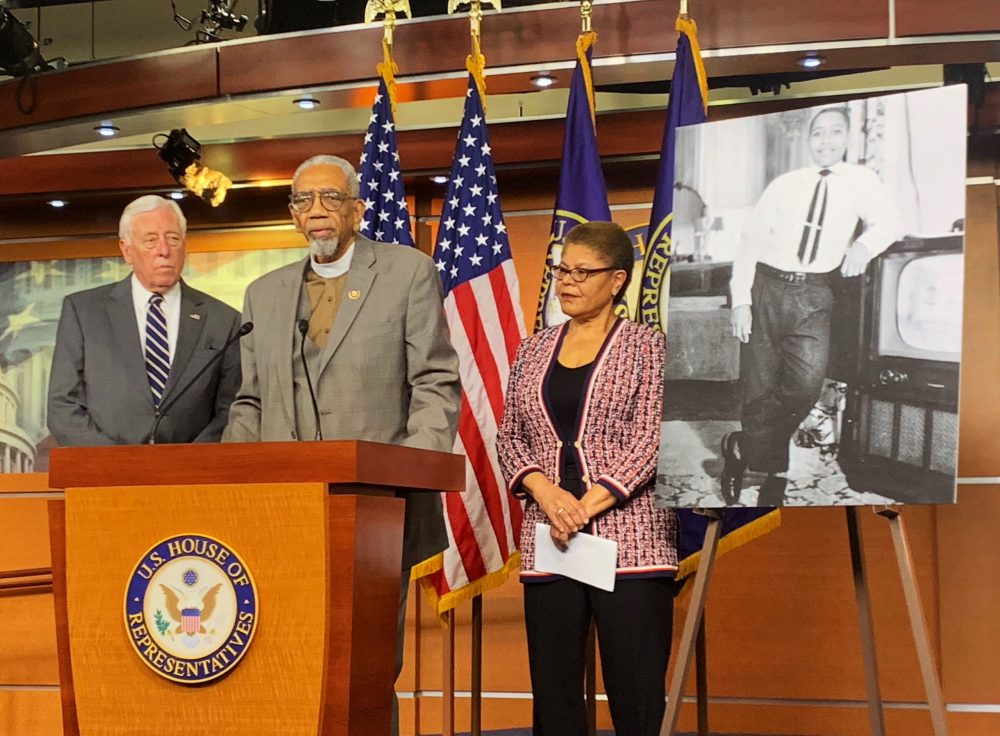WASHINGTON — The House passed a bill Wednesday to make lynching a federal hate crime. The measure was named after Emmett Till, a black 14-year-old who was murdered in Mississippi in 1955.
The final vote was 410-4. Three Republicans and Michigan Rep. Justin Amash, who switched his affiliation from Republican to independent in July, opposed the legislation.
“This bill is too late coming, but it is never too late to do the right thing,” House Majority Leader Steny Hoyer, D-Mechanicsville, said in a press conference before the vote.
Till’s story is personal for some members of Congress like Rep. Bobby Bush, D-Illinois, who authored the bill. He represents the Chicago district where Till lived.
The youth was visiting Mississippi when he was accused of offending a white woman in a store. Till later was seized by the woman’s husband and his half-brother. Till was tortured and murdered. His body was tied to a fan with barbed wire and thrown into the Tallahatchie River.
The two men accused of the murder were found innocent by an all-white jury, a verdict that outraged much of the nation and galvanized the civil rights movement.
Rush said he remembers his mother gathering his four siblings to show them the photo of Till laying in his open casket. The Rush family had moved from Georgia a year and a half before the murder.
“I’ll never forget this moment…she said, ‘This is the reason why I would not allow my boys to be raised in the South,’” Rush told reporters ahead of the vote.
Rep. Bennie Thompson, D-Mississippi, said he was emotional while considering the bill because he knew Till’s mother.
“We have to commit ourselves to make this country a better country, to try not to let it happen again,” Thompson said on the House floor.
Lynching — a “widely acknowledged practice in the United States until the middle of the 20th century,” according to the bill — was documented in all but four states. Over 4,700 people were reportedly lynched between 1882 and 1968, the bill says. Ninety-nine percent of the perpetrators weren’t punished.
“Lynching is a blot on the history of America, but the even greater blot is the silence that for too long maintained in the context of what people knew was happening,” Hoyer said.
Past acts of racism and violence can’t be erased by passing this legislation, House Speaker Nancy Pelosi, D-California, said, but calling them out will help the nation heal.
“As members of Congress and as Americans, we have a responsibility to acknowledge the horrors of the past so that they can never happen or occur again,” Pelosi said on the House floor.
The latest House bill is far from the first anti-lynching legislation that Congress has considered. Almost 200 were introduced during the first half of the 20th century, and three were passed by the House between 1920 and 1940.
Rep. George Henry White, a Democrat from North Carolina and the only black member of Congress at the time, proposed the first antilynching bill in 1900.
“I am proud of House leadership and Representative Rush…but I do have to say that we must admit it is a bit of a travesty that it has taken 120 years for the U.S. government to address this crime,” Rep. Karen Bass, D-California, who chairs the Congressional Black Caucus, said in the same press conference where Hoyer and Rush spoke.
The Senate has considered such legislation before but hasn’t enacted any despite requests from civil rights groups, previous presidents and the House, the bill says.
In 2018, the GOP-run Senate passed a bipartisan bill to make lynching a civil rights violation — proposed by Sens. Kamala Harris, D-California; Cory Booker, D-New Jersey and Tim Scott, R-South Carolina — but it failed to pass in the then-Republican controlled House. It passed in the Senate again last year.
“Lynchings were horrendous, racist acts of violence,” Harris said in a statement. “For far too long Congress has failed to take a moral stand and pass a bill to finally make lynching a federal crime…This justice is long overdue.”
The Senate is expected to vote on the bill by Friday, before the end of Black History Month. When asked if President Donald Trump is expected to sign it into law, Bass asked, “How could he not?”

